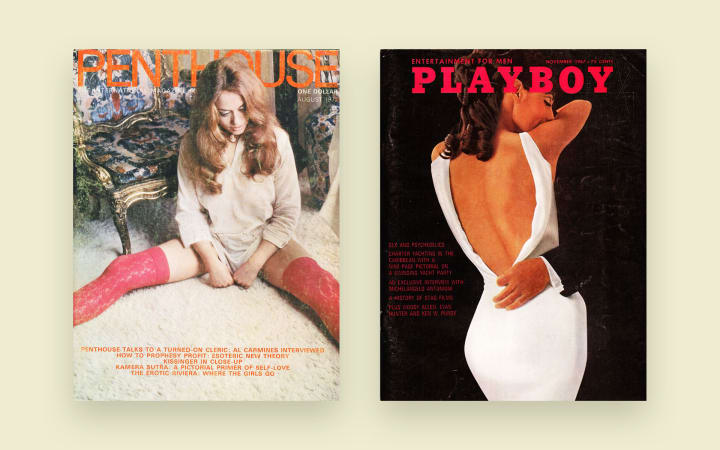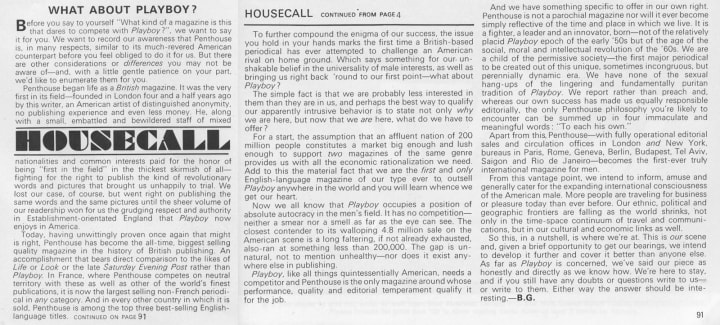History of Penthouse vs Playboy
An erotic battle royale provides timeless lessons about business competition.
Some say that this was the sexiest war ever fought, others maintain it was the most sexist war in history. Others pretend it never happened (you read Playboy for the articles, right?). One thing is certain: audiences all around the globe benefited from this battle of Penthouse versus Playboy, or as it’s alternately known, the Tortoise vs. the Hare.
Whatever you call it, this fight between the two publishing giants was a brutal, expensive all out war and provides modern companies with several perfect business lessons about competition, monopoly and aggressive marketing.
In 1953, with a circulation of more than 50,000, Playboy Magazine was the leading men’s magazine in the world. Playboy’s founder, Hugh Hefner, embodied the Playboy lifestyle, selling the fantasy of the girl next door. Only a few years after Playboy’s launch, Penthouse Magazine, led by the determined Bob Guccione, took direct aim at the market leader. In a series of ads, Penthouse went after the iconic hare, playing the role of the tortoise.
Penthouse Magazine was the first of its kind to take a direct action against the ubiquitous Playboy. Penthouse began life as a British magazine founded in London by a struggling American artist, Bob Guccione. With very little money, Guccione elevated Penthouse in England in the same respect Playboy had done in the States. By the mid-1970’s, Penthouse had become the biggest selling magazine in the history of British publishing. With its international popularity soaring, Penthouse began to compete with Playboy in the land of opportunity, on their rival’s ground in America.
Penthouse’s first American issue stated, “The assumption that an affluent nation of 200 million people constitutes a market big enough and lush enough to support two magazines of the same genre provide us with all the economic rationalization we need… we are the first and only English-language magazine of our type ever to outsell Playboy anywhere in the world and you will learn whence we get our heart. Now we all know that Playboy occupies a position of absolute autocracy in the men’s field. It has no competition – neither a smear nor a smell as far as the eye can see...Playboy, like all things quintessentially American, needs a competitor and Penthouse is the only magazine around whose performance, quality, and editorial temperament qualify it for the job."
A Battle Through The Ages

At its peak, Playboy sold seven million copies a month, while Penthouse sold five million. Today, the two former publishing empires sell less than one million copies combined. After over 50 years of battle, neither Playboy’s “hare” nor Penthouse’s “tortoise” can rightfully claim victory. Even now, after Penthouse bounced back from bankruptcy and Playboy removed nudity from publication, these two powerhouses fight on to be masters of erotica.
Yet what happens when sex no longer sells? This is something that Penthouse had to confront when they had to file for bankruptcy in 2013. FriendFinder Networks Inc, publisher of Penthouse Magazine, as well as numerous other adult-entertainment websites, was forced to file after they admitted to not turning a net profit since 2008. According to court documents, Ezra Shashoua, the company's Chief Financial Officer, blamed the lower revenue on a drop in membership and increased advertising costs for affiliates. Despite its fall from grace, FriendFinder Networks had an impressive run. Launched in 1996 by Andrew Conru, the company quickly attracted more than 500,000 affiliates to join. In 2007, Penthouse Media Group purchased FriendFinder’s parent company, Various Inc., for $500 million, which resulted in Penthouse changing its name to Friend Finder Network. However, this wasn’t enough for the company and in 2012, FriendFinder Networks Inc. offered $210 million for Playboy Enterprises, Inc. Due to Hugh Hefner’s majority ownership over the voting stock, the deal never went through. In hindsight, this was a smart move on Hefner’s part since the purchasing company went belly up three years later. Unfortunately, Playboy wasn’t safe for long.

Playboy's March 2016 Issue was the first issue that did not contain nudity.
As of March 2016, Playboy decided to no longer publish pictorials of nude women in their magazines, as well as on their online content. After a long and historic journey dedicated to challenging the social stigma towards nudity, critics were leery of the sudden change in content. However, as Playboy’s Chief Executive, Scott Flanders, explained in an interview, “When Hef created Playboy, he set out to champion personal freedom and sexual liberty at a time when America was painfully conservative. See: any popular movie, TV show, or song from that era. Nudity played a role in the conversation about our sexual liberties, and over 62 years the country made great strides politically and culturally. We like to think we had something to do with that.”
Despite the announcement about removing nudity from all forms of publication, Playboy has no plans to abandon the brand they have worked so hard to build. So while Playboy magazine is a dying publication, it is far from being a dying brand.
According to a New York Times article, “The Company now makes most of its money from licensing its ubiquitous brand and logo around the world – 40 percent of that business is in China even though the magazine is not available there – for bath products, fragrances, clothing, liquor and jewelry among other merchandise.”
"Playboy, like all things quintessentially american, needs a competitor and penthouse is the only magazine around whose performance, quality, and editorial temperament qualify it for the job."—Bob Guccione, First International Penthouse (September 1969)
Even with the worldwide brand recognition, will this new tactic of less risqué content be enough to revamp Playboy? Old and new subscribers alike will be turning to the publication just for “humor, sex and culture, style, and video games.” So what differentiates them from any similar publication? According to sources, Playboy is entering this niche field too late in the game and they will be crushed by the larger media brands out there like Vice, IGN and Maxim. When their nudity clause goes into full effect, readers will be able to decide if Playboy’s new plans will succeed or if it is finally time for them to hang up the bunny ears and go home.
Similarly, Penthouse Magazine is turning away from print publication entirely. After 50 years of publication, Penthouse has recognized their inability to keep up in a digital world. The publisher issued a statement in regards to these big changes, “Reimagined for the preferred consumption of content by consumers, the digital version of Penthouse Magazine will combine and convey everything readers know and love about the print magazine experience to the power of a digital experience.”
This announcement came as a surprise for people all around the world because in the not too distant past, Playboy and Penthouse each sold five million or more copies a month, and were so much a part of the culture that in 1986 a federal judge ruled that denying blind people a Braille version of Playboy violated their First Amendment rights.
Shifting Gears to Find the Market
This isn’t Penthouse Magazine’s first attempt at shifting gears. For example, in the late 1990s, the magazine began to show more “fetish” content such as urination, bondage, and facials. When readers opposed the new raunchy content and their subscribers shrank, the publication was forced to switch momentum once again.
Penthouse isn’t the only giant magazine to fall from power. A majority of the traditional erotic magazines have been hit hard due to the fact there is an unlimited amount of nudity that can be accessed online; free, at any time. The reign of erotic magazines has ended, as the rise of instant digital media has begun.
Penthouse and Playboy, after years of battling against each other, have succumbed to a fate that many magazines currently face - digital death. Whether or not they can successfully adapt to the changing times will prove once and for all which animal crosses the finish line first in this epic war - the tortoise or the hare.
In a highly unusual business move – especially for the time – Penthouse decided to deal directly with the bunny in the room when it published its first U.S. edition in 1969. Instead of skirting the issue, Penthouse founder Bob Guccione wrote a now classic letter explaining why he was taking on Playboy and the key ways in which they differed from Penthouse; while it was an extremely effective marketing tool, it also helped established his brand right at the outset. As history would show, it worked brilliantly…
Letter from Bob Guccione Below

“Before you say to yourself “What kind of a magazine is this that dares to compete with Playboy?”, we want to say it for you. We want to record our awareness that Penthouse is, in many respects, similar to its much-revered American counterpart before you feel obliged to do it for us. But there are other considerations or differences you may not be aware of–and, with a little gentle patience on your part, we’d like to enumerate them for you. Penthouse began life as a British magazine. It was the very first in its field–founded in London four and half years ago by this writer, an American artist of distinguished anonymity, no publishing experience and even less money. He, along with a small, embattled and bewildered staff of mixed nationalities and common interests paid for the honor of being “first in the field” in the thickest skirmish of all–fighting for the right to publish the kind of revolutionary words and pictures that brought us unhappily to trial. We lost our case, of course, but went right on publishing the same words and the same pictures until the sheer volume of our readership won for us the grudging respect and authority in Establishment-oriented England that Playboy now enjoys in America.
Today, having unwittingly proven once again that might is right; Penthouse has become the all time, biggest selling quality magazine in the history of British publishing. An accomplishment that bears direct comparison to the likes of Life or Look or the late Saturday Evening Post rather than Playboy. In France, where Penthouse competes on neutral territory with these, as well as other of the world’s finest publications, it is not the largest selling non-French periodical in any category. And in every other country in which it is sold, Penthouse is among the top three best-selling English-language titles. To further compound the enigma of our success, the issue you hold in your hands marks the first time a British-based periodical has ever attempted to challenge an American rival on home ground. Which says something for our unshakable belief in the universality of male interests, as well as bringing us right back ‘round to our first point–what about Playboy?
The simple fact is that we are probably less interested in them than they are in us, and perhaps the best way to qualify our apparently intrusive behavior is to state not only why we are here, but now that we are here, what do we have to offer? For a start, the assumption that an affluent nation of 200 million people constitutes a market big enough and lush enough to support two magazines of the same genre provide us with all the economic rationalization we need. Add to this the material fact that we are the first and only English-language magazine of our type ever to outsell Playboy anywhere in the world and you will learn whence we get our heart. Now we all know that Playboy occupies a position of absolute autocracy in the men’s field. It has no competition–neither a smear nor a smell as far as the eye can see. The closest contender to its walloping 4.8 million sales on the American scene is a long faltering, if not already exhausted, also ran at something less than 200,000. The gap is unnatural, not to mention unhealthy–nor does it exist anywhere else in publishing. Playboy, like all things quintessentially American, needs a competitor and Penthouse is the only magazine around whose performance, quality and editorial temperament qualify it for the job.
And we have something specific to offer in our own right. Penthouse is not a parochial magazine nor will it ever become simply reflective of the time and place in which we live. It is a fighter, a leader and an innovator, born–not of the relatively placed Playboy epoch of the early ‘50s but of the age of the social, moral and intellectual revolution of the ‘60s. We are a child of the permissive society–the first major periodical to be created out of this unique, sometimes incongruous, but perennially dynamic era. We have none of the sexual hang ups of the lingering and fundamentally puritan tradition of Playboy. We report rather than preach and, whereas our own success has made us equally responsible editorially, the only Penthouse philosophy you’re likely to encounter can be summed up in four immaculate and meaningful words: “To each his own.” Apart from this, Penthouse–with fully operational editorial sales and circulation offices in London and New York bureaus in Paris, Rome, Geneva, Berlin, Budapest, Tel Aviv, Saigon and Rio de Janeiro–becomes the first-ever truly international magazine for men.
From this vantage point, we intend to inform, amuse and generally cater for the expanding international consciousness of the American male. More people are traveling for business or pleasure today than ever before. Our ethnic, political and geographic frontiers are falling as the world shrinks, not only in the time-space continuum of travel and communications, but in our cultural economics links as well. So this, in a nutshell, is where we’re at. This is our scene and, given a brief opportunity to get our bearings, we intend to develop it further and cover it better than anyone else. As far as Playboy is concerned, we’ve said our piece as honestly and directly as we know how. We’re here to stay, and if you still have any doubts or questions write to us –and or write to them. Either way the answer should be interesting.”
–Bob Guccione, First Issue of Penthouse, 1969
About the Creator
Natasha Sydor
brand strategy @ prime video







Comments
There are no comments for this story
Be the first to respond and start the conversation.